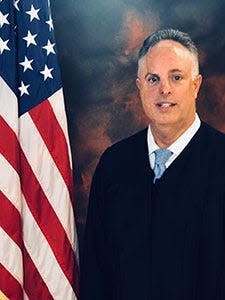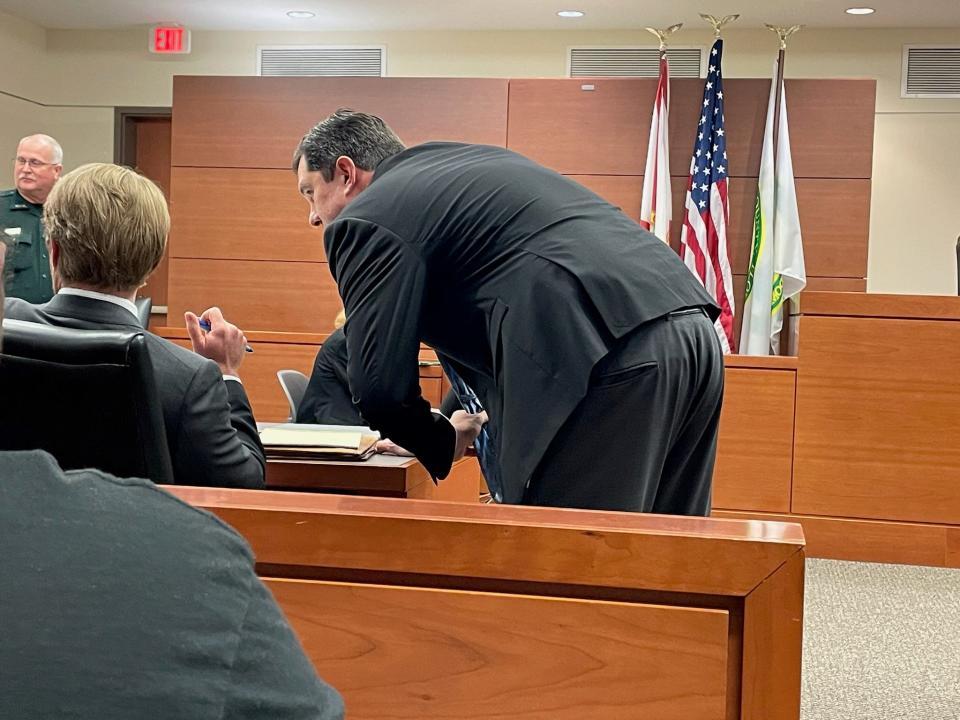Ocala fire fee lawsuit: Judge rules on attorney fees, fund distribution, related matters
A judge has ruled that the law firm representing plaintiffs in the class-action lawsuit against the City of Ocala for the illegal collection of a fire fee is entitled to more than $6 million in compensation for its work.

Circuit Judge Robert Hodges, in a 22-page order dated May 16, states that within 10 days of his order, "The City shall disburse the sum of $6,561,911.70 to Bowen/Schroth from the $79,282,909.44 Common Fund to pay $6,393,188.37 in attorney's fees to Class Counsel, reimburse Class Counsel for $68,723.33 in non-taxable costs, and to pay each Class Representative $50,000."
Hodges said that the city "shall retain $100,000 in the Common Fund for Class Counsel's fees, costs and expenses incurred after November 1, 2021, to be disbursed after motion and hearing in the Court's discretion."
The fee: Residents pack courtroom to learn more about City of Ocala's $80 million fire fee payout
Booming: The Marion County Airport, near Dunnellon, is having a moment
Coming soon: Work underway for new park in NW Marion; will feature hiking, horse trails, playground
Details about the payment
Class members (those who paid the fire fee) will receive their funds from the remaining $72,620,997.74 from the common fund within 60 days of Hodges' order.
If, for example, a class member paid $1,000 in illegal taxes, then the "class member would receive a refund check of $915.97," according to the judge's ruling.
Before mailing the check, "the City shall verify each class member's current mailing address" through several means such as the U.S. Postal Service, Experian, Xverify and other resources, the judge said.
The refund check will be valid for 180 days from the date it was issued. Any checks not cashed within the time allotted will be void.
Hiring a claims administrator
The order mentions that if a class member's address cannot be verified by the city, then the city will use a claims administration process. At Tuesday's Ocala City Council meeting, council members voted 5-0 to hire a claims administration for up to $200,000 to do that job.
Any class member with "an undeliverable address" can claim his or her refund in writing by filing a claim form through regular or electronic mail. The claim period will begin on July 1, 2022 and end July 1, 2023.
During the claim period, the city will put a link called "City Utility Customer Refund Information" on its website, ocalafl.org. The link will be in English and Spanish and will provide information about the court-ordered refund, how to make a claim, and the claim form itself.
The order states that any refunds left with the city after the expiration claim period of July 1, 2023, will go to a second distribution to class members who have already cashed their checks as part of the first distribution. The second distribution will occur within 60 days from the time of the claim's expiration, meaning after July 1, 2023.

Any refunds remaining with the city after April 30, 2024, will got to the city's general fund for fire services.
"This court retains jurisdiction to oversee and manage all aspects of this class action case," Hodges wrote.
How it got to this point
Between 2006 and 2010, the City of Ocala enacted several ordinances that established, repealed and later re-established a fire fee. The goal was to offset a portion of the general operating costs for the city's fire service, according to a summary included in the judge's order.
In September 2013, Bowen/Schroth was hired to challenge the legality of that fee. It took several years, but the plaintiffs eventually prevailed, and in October the court ordered the city to pay the $79,282,909.44.
The order states that the law firm worked thousands of hours on the case and, had it not won, it would not have been paid any money.
The litigation was complex and historic; it was the first appellate case to analyze a local government user fee as a funding mechanism for public safety fire services, according to the court order. The order also states that no Florida appellate court had declared a user fee for public fire safety services to be an unlawful tax.
Schroth is recognized as one of two Florida lawyers who's certified as an expert in city, county, and local government law and business litigation and has class action and appellate experience, the order states.
To repay the fee, city officials have decided to take $20 million from its general fund reserves and the remaining $60 million from a bank loan. City residents now pay a new fire tax to help support fire services.
Contact Austin L. Miller at austin.miller@starbanner.com
This article originally appeared on Ocala Star-Banner: Ocala, Florida judge clears up matters in long-running fire fee suit

